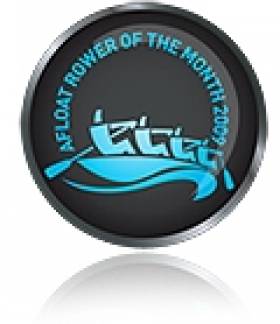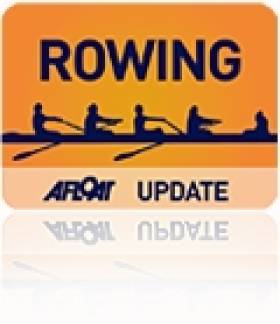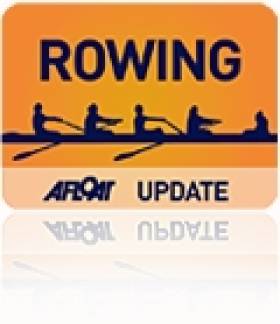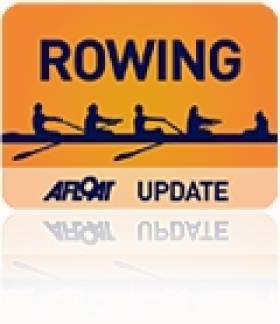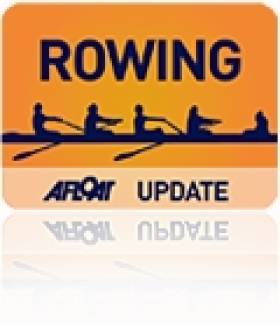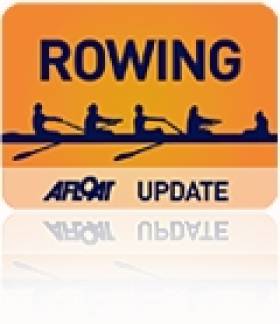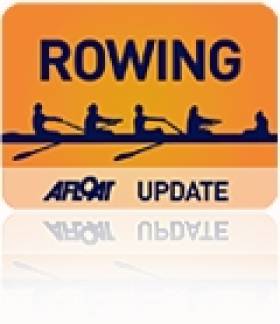Displaying items by tag: Cork Regatta
Cork Sculling Ladder Stays on Track
#Rowing: The Cork Sculling Ladder is active, with races last weekend and challenges this Sunday, January 17th. Feargal O’Sullivan of Cork Boat Club came out on top in his race with David Higgins of Presentation College Rowing Club last Sunday.
2015 -2016 CORK SCULLING LADDER
Sponsored by : Hanley Calibration Ltd.
Result and Challenges.
Result.
Sunday 10.01.2016.
1. (17) Feargal O’Sullivan - Cork Boat Club. 2. (15) David Higgins - Presentation College Rowing Club. 4 L.
Challenges.
Sunday 17.01.2016.
08.30am. FC. (77) Ross Cudmore - Cork Boat Club v (60) Jack O’Donovan - Presentation College Rowing Club.
08.40am. (85) Kieran White - Cork Boat Club v (78) Cormac O’Connell - Presentation College Rowing Club.
12.00 noon. (10) Barry O’Flynn - Cork Boat Club v (8) Stewart Channon - Shandon Boat Club.
Sunday 31.01.2016.
08.00am. (13) Barry Connolly - Cork Boat Club v (11) Thomas Murphy - Lee Rowing Club.
08.10am. (22) Cormac Corkery - Cork Boat Club v (21) Luke Guerin - Lee Rowing Club.
08.20am. (15) Feargal O’Sullivan - Cork Boat Club v (14) David Breen - Lee Rowing Club.
08.30am. (FC)(31) Liam O’Connell - Cork Boat Club v (12) Hugh Deasy - Lee Rowing Club.
08.40am. (FC)(30) Evan Curtin - Cork Boat Club v (23) Peter Jackson - Lee Rowing Club.
08.50am. (FC)(52) Conor Twohig - Cork Boat Club v (39) Ray Fitzgerald - Lee Rowing Club.
09.00am. (89) Conor O’Callaghan - Cork Boat Club v (84) Luke Lee - Lee Rowing Club.
All races to take place at given times. Racing depends on weather conditions.
Trinity Senior Eight are Afloat Rowers of the Month
#ROWING: The Afloat Rowers of the Month for June are Trinity’s men’s senior eight. The Dublin University Boat Club crew had a convincing win in the Division One final at Cork Regatta, outpacing UCD and NUIG/Gráinne Mhaol. They crew took the Leander trophy, one of the most impressive prizes on offer in Irish sport. Well done to: Gearóid Mahon, Ian Hurley, John Magan, Michael Corcoran, Patrick Moreau, Mark Kelly, Liam Hawkes, David Butler and cox Cian Flynn.
Rower of the Month awards: The judging panel is made up of Liam Gorman, rowing correspondent of The Irish Times and David O'Brien, Editor of Afloat magazine. Monthly awards for achievements during the year will appear on afloat.ie and the overall national award will be presented to the person or crew who, in the judges' opinion, achieved the most notable results in, or made the most significant contribution to rowing during 2015. Keep a monthly eye on progress and watch our 2015 champions list grow.
Trinity Eight In Command at Cork Regatta
#ROWING: Trinity won the men’s eights impressively at the Cork Regatta at the National Rowing Centre today. The college crew took an early lead and extended it to a length at 500 metres. The chasing UCD and NUIG/Grainne Mhaol crews looked never likely to catch Trinity from that point on. The winning margin was over five seconds, with UCD taking second. NUIG’s intermediate crew won the women’s eights by an even bigger margin of over seven seconds from Skibbereen’s junior 18A eight.
Cork Regatta, National Rowing Centre (Selected Results)
Sunday
Men
Eight – Div One – A Final: 1 Trinity (senior) 5:40.667, 2 UCD (intermediate) 5:45.957, 3 NUIG/Grainne Mhaol 5:46.533; 4 Queen’s (Club One) 5:54.94; 5 St Joseph’s (jun 18A) 6:02.257. B Final: UCD (Club One) 6:01.593. C Final: Trinity (Club One) 6:28.997.
Four – Div One – A Final: 1 NUIG/Grainne Mhaol (sen) 6:07.807, 2 UCC A 6:10.83, 3 Carlow (sen) 6:15.543. Four, coxed – Div Two – A Final: Skibbereen (Club Two) 6:43.837. B Final: Trinity (Club Two) 7:04.517; 3 Col Iognaid (jun 16) 7:06.357.
Sculling
Quadruple – Div Two – A Final: Cork (jun 16) 6:45.45; 6 Lee (Club Two) 7:03.56. B Final: Workmans (jun 16) 6:59.8; 4 Workman’s (jun 18B) 7:06.817. C Final: Carlow (jun 16) 7:05.697.
Double – Div One – A Final: 1 Old Collegians (D Neale, S Jacob; sen) 6:29.50, 2 Portadown/Skibbereen (sen) 6:34.43, 3 Shandon (jun 18A) 6:44.873. B Final: Waterford (inter) 6:46.473. C Final: Lee (inter) 6:48.227; 4 Methody (Club One) 7:10.627.
Single – Div Two – A Final: Belfast BC (A Murray; jun 18B) 7:35.483, 2 Cappoquin (Aherne; club two) 7:5.052; 4 Lee (Jackson, jun 16) 7:49.427. B Final: Clonmel (Dundon; jun 16) 7:49.347. C Final: St Michael’s (O’Byrne; jun 16) 7:48.40.
Women
Eight – Div One – A Final: 1 NUIG (inter) 6:43.177, 2 Skibbereen (jun 18A) 6:50.87, Commercial (inter) 6:57.593. Four – Div One – A Final: 1 Skibbereen (jun 18A) 7:08.330, 2 Shannon (sen) 7:12.137, 3 Skibbereen (sen) 7:27.62. Div Two, coxed – A Final: Queen’s A (Club Two) 7:27.26; 6 St Michael’s (jun 16) 8:32.17.
Sculling
Double – Div One – A Final: 1 Skibbereen (A Casey, E Hegarty; jun 18A) 7:28.957, 2 Lee (jun 18A) 7:33.43, 3 St Michael’s (inter) 7:43.430. B Final: Belfast BC A (inter) 7:39.570.
Single – Div Two – A Final: Lee (Cremin; Club Two) 8:16.437; Workman’s (Burns; jun 16) 8:32.55; 6 Shandon (jun 18B) 8:59.37. B Final: Cork (jun 16) 8:52.337. C Final: Lee Valley (jun 16) 8:56.26.
NUIG/Grainne Mhaol Four See Off Strong UCC Challenge
#ROWING: UCC gave them a good race, but NUIG/Grainne Mhaol moved away in the closing stages to prove themselves the top men’s four at Cork Regatta. The experience of Sean Jacob and Dave Neale also told in the men’s double scull, with the Ireland under-23 double of Sam McKeown and Andrew Griffin had to give way to the Old Collegians men. The women’s four and double went to young Skibbereen crews: Aoife Casey and Emily Hegarty, who are both 16, were part of the winning four and then switched into the double and won again.
Cork Regatta, National Rowing Centre (Selected Results)
Sunday
Men
Four – Div One – A Final: 1 NUIG/Grainne Mhaol (sen) 6:07.807, 2 UCC A 6:10.83, 3 Carlow (sen) 6:15.543. Four, coxed – Div Two – A Final: Skibbereen (Club Two) 6:43.837. B Final: Trinity (Club Two) 7:04.517; 3 Col Iognaid (jun 16) 7:06.357.
Sculling
Double – Div One – A Final: 1 Old Collegians (D Neale, S Jacob; sen) 6:29.50, 2 Portadown/Skibbereen (sen) 6:34.43, 3 Shandon (jun 18A) 6:44.873. B Final: Waterford (inter) 6:46.473. C Final: Lee (inter) 6:48.227; 4 Methody (Club One) 7:10.627.
Single – Div Two – A Final: Belfast BC (A Murray; jun 18B) 7:35.483, 2 Cappoquin (Aherne; club two) 7:5.052; 4 Lee (Jackson, jun 16) 7:49.427. B Final: Clonmel (Dundon; jun 16) 7:49.347. C Final: St Michael’s (O’Byrne; jun 16) 7:48.40.
Women
Four – Div One – A Final: 1 Skibbereen (jun 18A) 7:08.330, 2 Shannon (sen) 7:12.137, 3 Skibbereen (sen) 7:27.62.
Sculling
Double – Div One – A Final: 1 Skibbereen (A Casey, E Hegarty; jun 18A) 7:28.957, 2 Lee (jun 18A) 7:33.43, 3 St Michael’s (inter) 7:43.430. B Final: Belfast BC A (inter) 7:39.570.
UCD/Old Collegians Fastest Quadruple at Cork Regatta
# Rowing: The composite quadruple from UCD and Old Collegians were impressive victors at Cork Regatta. Commercial, who beat them at Dublin Metropolitan, were left behind as the crew of Dave Neale, Albert Maher, Sean Jacob and new man Turlough Hughes won well. Skibbereen won the women’s Division One quadruple, while Commercial won the women’s Division Two eights in an exciting race. UCD’s intermediates were the top coxed four – beating Queen’s in a good race.
Cork Regatta, National Rowing Centre (Selected Results)
Saturday
Men
Four, coxed – Div One – A Final: 1 UCD (inter) 6:27.52, 2 Queen’s (inter) 6:28.52, 3 UCD B (inter) 6:29.16; 4 Skibbereen (sen) 6:38.0. B Final: St Michael’s (inter) 6:53.83; 2 St Michael’s (jun 18A) 6:39.19.
Sculling
Quadruple – Div One – A Final: 1 Old Collegians/UCD (sen) 5:58.95, 2 Commercial (sen) 6:06.11, 3 Castleconnell (jun 18A) 6:15.80. B Final: Cork B (jun 18A) 6:24.97.
Double – Div Two – A Final: 1 Cork C (jun 16) 7:07.81, 2 Lee (jun 16) 7:14.63, 3 Shandon A (club two) 7:20.63; 6 Carlow (jun 18B) 7:27.78. B Final: Waterford A (jun 16) 7:26.43. C Final: Shannon B (jun 18B) 7:22.38.
Women
Eight – Div Two – A Final: 1 Commercial (Club Two) 6:47.24, 2 Queen’s (Club Two) 6:51.15, 3 Col Iognaid (Jun 16) 7:06.11.
Four – Div One, coxed – A Final: 1 NUIG (inter) 7:15.85, 2 Shannon (sen) 7:20.47, 3 Commercial (inter) 7:21.80. B Final: Garda (Club One) 7:48.47.
Sculling
Quadruple – Div One – A Final: 1 Skibbereen (jun 18A) 6:51.67, 2 Lee (Jun 18A) 7:00.6, 3 Galway (jun 18A) 7:27.46.
Double – Div Two – A Final: 1 Workmen’s (jun 16) 7:43.13, 2 Cork (Club Two), Cork (jun 16) 7:48.08, 4 Shandon (jun 18B) 7:48.74. B Final: Lee (jun 18B) 8:05.00. C Final: Workmen’s (jun 18B) 8:41.15.
O'Donovan Brothers Best Scullers at Cork Regatta
#ROWING: Paul O’Donovan of UCD and his brother Gary, representing Skibbereen, finished first and second in the single sculls at Cork Regatta at the National Rowing Centre today, with another Skibbereen oarsman, Erik Rowan, third. Reigning Irish champion John Keohane was fourth in a race run in a very strong tailwind. The women’s single also went to Skibbereen, in the form of 16-year-old Emily Hegarty. There were timing problems, which saw the men’s and women’s pairs finals run off on the draw made for the heats.
Cork Regatta, National Rowing Centre (Selected Results)
Saturday
Men
Eight – Div Two – A Final: 1 Commercial (Club Two) 6:07.87, 2 St Michael’s (Club Two) 6:14.16, 3 UCD (nov) 6:17.04. B Final: St Joseph’s (jun 16) 6:21.33.
Pair – Division One (run on heat seeding): 1 Skibbereen/Old Collegians (sen) 6:33.2, 2 UCC A (inter) 6:52.3, 3 Commercial (sen) 6:53.2; Jun 18A: St Joseph’s 7:09.2.
Sculling,
Single – Div One – A Final: 1 UCD (P O’Donovan, sen) 6:55.74, 2 Skibbereen (G O’Donovan) 7:03.20, 3 Skibbereen (E Rowan) 7:11.35; 5 Skibbereen (J Ryan; lightweight) 7:15.57. B Final: Athlone (Munnelly; jun 18A) 7:18.86; 4 Lee (O’Sullivan; inter) 7:30.85; 5 Carlow (Keating; Club One) 7:34.12. C Final: Skibbereen (McCarthy; light) 7:22.83.
Women
Pair – Div One – Final (run on heat seeding): 1 Trinity A (sen) 7:38.43, 2 Trinity B (sen) 7:48.19, 3 Shannon B (sen) 7:50.06; Jun 18A: Skibbereen 7:50.10; Club One: UCC 8:04.18.
Sculling
Quadruple – Div Two – A Final: 1 Cork A (jun 16) 7:26.15; 3 Methody (jun 18B) 7:43.65; 5 Garda (Club Two) 7:49.65. B Final: Galway (jun 16) 7:59.76. C Final: Clonmel (Nov) 8:37.90.
Single – A Final: Skibbereen (E Hegarty; jun 18A), 2 Belfast BC (S Quinn; light), 3 Belfast BC (K Turner; light); 6 Castleconnell (Vascotto; jun 18A). B Final: Skibbereen (A Casey; jun 18A); 2 St Michael’s (A O’Sullivan; sen); 6 Belfast BC (O Blundell; Club One). C Final: Neptune (C Feerick; jun 18A); 3 Methody (C Deyermond; inter).
UCD Push NUIG/Grainne Mhaol Hard at Cork Rowing Regatta
#ROWING: Gráinne Mhaol/NUIG were pushed hard by UCD, but came away with the Division One eights title at Cork Grand League Regatta at the National Rowing Centre. NUIG came in third, despite having to do without the services of Kevin Neville, who had fallen ill during the heats. The experienced Gráinne Mhaol crew of Dave Mannion, Alan Martin, Cormac Folan and James Wall won the Division One four, while Skibbereen won the women’s four.
Andy Harrington of UCC won the Division One single sculls from Eimantas Grigalius of Three Castles and Fergus Fauvel, a New Zealander studying in Galway. Fauvel also rowed at number four for the winning eight.
Catríona Jennings of Commercial, who only took up rowing in the past two years after competing as a runner at the Olympic Games, won the Division One single sculls.
The timing system at the regatta, a bugbear at a number of Grand League events, caused some difficulties.
Grainne Mhaol/NUIG Take Leander Trophy at Cork Regatta
# ROWING CORK REGATTA: Grainne Mhaol/NUIG dominated the final race of the day, the A Final of the men’s eight at Cork Regatta today, with NUIG’s intermediate eight second. Grainne Mhaol had also won the men’s four.
Trinity also had a good day, winning the women’s eight and shading the men’s coxed four – they had .6 of a second to spare over NUIG. Skibbereen were strong in the sculling events, with wins in the men’s and women’s quadruple sculls and the men’s double – the Ireland under-23 crew of Gary O’Donovan and Shane O’Driscoll.
The men’s junior four which was trialling for a place at the Coupe de la Jeunesse (Kevin Fallon and Jack Smyth of St Joseph’s, and twin brothers David and Brian Keohane of Presentation, Cork) landed their places. The women’s four which hopes to represent Ireland at the World Under-23 Championships (Lisa Dilleen, Aifric Keogh, Ailish Sheehan and Emily Tormey) also won their final.
Sinead Jennings and Claire Lambe impressed when they teamed up in a double scull, winning well and setting a good time of seven minutes 2.1 seconds.


























